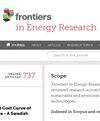Assessing the current situation of constructed wetland-microbial fuel cells as an alternative power generation and wastewater treatment in developing countries
IF 2.6
4区 工程技术
Q3 ENERGY & FUELS
引用次数: 0
Abstract
Developing countries facing population growth and increased energy demand present simultaneous challenges regarding wastewater treatment and electricity supply. Constructed wetland-microbial fuel cells (CW-MFCs) offer a dual solution to the challenges of insufficient electricity and wastewater treatment by integrating indigenous plant species. CW-MFCs provide sustainable power generation and wastewater treatment. This approach can enhance sustainability and foster a circular economy by utilising plant-derived byproducts as an added product. Current research indicates various novel designs for effective wastewater treatment and potential power generation. Future studies focusing on rural settings and upscaling operations can apply advanced techniques like mass spectrophotometry and metagenomics to refine the technology for grid use. Developing CW-MFC technology will catapult the idea of developing a robust strategy for addressing power supply and sanitation issues in developing regions. This will also aid in continuous research into system optimisation and microbial communities, aiding long-term viability.评估发展中国家将建造湿地-微生物燃料电池作为替代发电和废水处理方式的现状
面临人口增长和能源需求增加的发展中国家同时面临着废水处理和电力供应方面的挑战。建造湿地微生物燃料电池(CW-MFCs)通过整合本地植物物种,为解决电力不足和废水处理问题提供了双重解决方案。CW-MFCs 可提供可持续发电和废水处理。通过利用植物副产品作为附加产品,这种方法可以提高可持续性并促进循环经济。目前的研究表明,各种新型设计可有效处理废水,并具有发电潜力。未来以农村环境和升级操作为重点的研究可以应用质谱光度法和元基因组学等先进技术来完善该技术,以便在电网中使用。开发 CW-MFC 技术将推动制定强有力的战略,解决发展中地区的电力供应和卫生问题。这也将有助于对系统优化和微生物群落进行持续研究,从而提高长期可行性。
本文章由计算机程序翻译,如有差异,请以英文原文为准。
求助全文
约1分钟内获得全文
求助全文
来源期刊

Frontiers in Energy Research
Economics, Econometrics and Finance-Economics and Econometrics
CiteScore
3.90
自引率
11.80%
发文量
1727
审稿时长
12 weeks
期刊介绍:
Frontiers in Energy Research makes use of the unique Frontiers platform for open-access publishing and research networking for scientists, which provides an equal opportunity to seek, share and create knowledge. The mission of Frontiers is to place publishing back in the hands of working scientists and to promote an interactive, fair, and efficient review process. Articles are peer-reviewed according to the Frontiers review guidelines, which evaluate manuscripts on objective editorial criteria
 求助内容:
求助内容: 应助结果提醒方式:
应助结果提醒方式:


